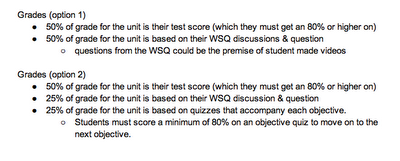Ramsey has the belief that you should have an inquiry that gets the kids interested, but slightly confused, then they watch the videos as needed to help them through the inquiry. He's not a strong supporter of the mastery concept.
Brian believes in using videos for concepts that you have to repeat over & over again. He tends to front load his videos (showing them first), then lets the kids work through higher order activities in class. Brian allows his students to watch the videos & do the work at a time that suits them. He even goes so far as to let the kids work on other subjects during his class time (assuming they've completed the required coursework for him & have mastered the concept).
Jon definitely believes in the mastery concept. He sets limits for his students in regards to how many videos they need to finish by a certain time. His kids go at their own pace...to a certain extent.
Luckily, I had the time to sit down & think things through (with the guidance of flipclass pro Jon Bergmann). What I've come up with seems (to me) to be a mash-up of Ramsey, Jon & Brian's classrooms.
I intend for my students to work at their own pace (similar to Jon), but within parameters. For example, they may need to have 2-3 objectives mastered by the end of the week. When and where they watch the videos is going to be up to them, but I will expect that they have their designated work done by the designated time (similar to Brian). The beginning of each unit will have some sort of an inquiry project that will hopefully be too hard for them to solve then, but will be totally solvable by the end of the unit. My hope is that they will get interested in the beginning, want to see the videos to help them answer the problem, then solve the inquiry as the unit progresses (similar to Ramsey).
Other changes in my class revolve around expectations while watching the video, and grading. While watching the video the students will complete a WSQ...if you're not sure how that will look in my class, click here. In regards to assessment, I'm not 100% sure how I'm going to grade right now because I don't know if I'll have the flexibility to grade the way I want. My district works hard to get every kid the same experience, which means we have common assessments. But here are the plans I'm thinking of in regards to grading.
So what will my typical day look like? Here's what I'm thinking (I have my students for about 50 minutes a day):
Kids come in & we meet for a couple minutes, just to touch base, then it's off to work! Kids will be doing one of the following:
- Watching a video
- Having a group WSQ discussion (with me present to help give them a grade)
- Working on practice problems (together or independently)
- Taking a quiz or test on the computer (using Moodle)
- Working on another subject...if they are caught up
- Completing a math lab (that's what I'm going to call my real world application problems)
- Making videos of their own that center around the assigned topic
So as you can see, it is going to be slightly chaotic...but I'm thinking this kind of chaos is going to be awesome!
If anyone reading this has some ideas that might make this run smoothly, I'd love the feedback.

Hi Delia!
ReplyDeleteI love how you have taken ideas from several different sources and picked out what you want to do in your classroom. That is something that I have struggled with in the past - there are so many great ideas, great ways of doing things, and if we try to do everything we will go crazy! I've also come to find that there isn't one "right" way to flip because I have different kids and a different classroom than others... so what works for them may not work the same way for me.
I think the plan you have set up is great. I like grading option 2 personally, because I like having mini-quizzes for students to check their progress on objectives as they go throughout the unit. It's a great check for them and for me.
A few questions for you: How are you planning on "grading" the WSQ discussions? What tools are you going to use to have your students make their own videos?
Anyways, I'm excited to journey with you through this next year!
Enjoy your last little bit of summer!
Crystal